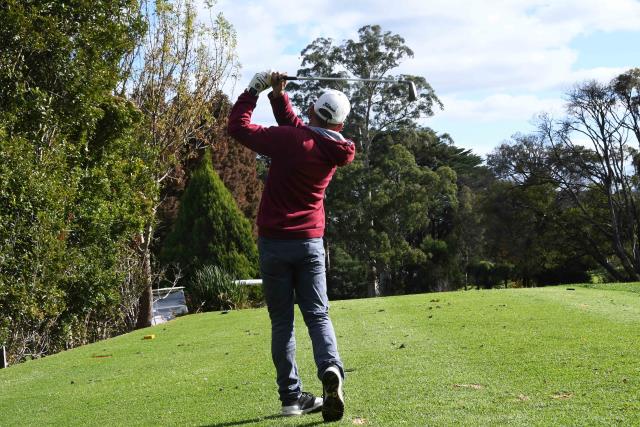 Paramedic Jason Callanan gives parents and young children a talk about how a road smash can effect their bodies. The talk was part of the inaugural Yarra Ranges ROADWhyz program at Badger Creek.
Paramedic Jason Callanan gives parents and young children a talk about how a road smash can effect their bodies. The talk was part of the inaugural Yarra Ranges ROADWhyz program at Badger Creek.
By Kath Gannaway
THE ROADWhyz Choice and Consequence program removes the cottonwool surrounding young people and the reality of road trauma.
It exposes them, and their parents, to the brutal, bloody, gory reality of what they, their friends and family can expect if they’re in a car when it crashes – either driving or as a passenger.
It exposes them to the debilitating, raw emotion their death or horrible, life-long injuries wreak on those they love.
Two photos of a young teenager, Nikki, hit home.
The first photo is the fresh, beautiful teenage face of an angel – a flawed, impetuous 16-year-old angel maybe; the second a face unrecognisable as anything very much – blood, brain, bone and hair, is shocking.
You could tell by the collective gasp.
ROADWhyz Vic team facilitator, Silvan paramedic Jason Callanan and specialist emergency nurse Andre Kogan, who delivered the inaugural program at Badger Creek fire station last week, had warned the audience.
No-one left the room.
They go on to tell of how Nikki slammed into a concrete pylon in her parent’s Porsche. She was upset about something and made a bad choice she didn’t live to regret.
“This is part of Nikki on the pavement,” says Andre.
It’s not emotional. It’s factual. He explains what he calls a ‘degloving injury’.
“The force has split her head in two, the scalp is pulled back off her face; this is her jaw.”
There’s silence now.
“That’s what can happen when you speed, drive on drugs or alcohol, when you think you’re invincible and that no-one on the road can touch you… when you think you’re a hero.”
Removing the cottonwool in this case is more like ripping a Band-Aid off bare skin.
But everyone knows what happens if you leave a Band-Aid on too long and Jason, Andre and the emergency service people who are supporting ROADWhyz are not alone in believing that this one needs to come off.
The program run at Badger Creek is a snapshot version of the ROADWhyz program they want run in high schools and TAFEs for students in the high risk category of 17 to 25 year olds.
Jason makes no apologies for the graphic nature of the program but says it’s not all about shock value.
“There’s a bit too much cottonwoolling our kids and protecting them from the realities of road trauma,” he said.
“We’re not there to just shock them. The idea is to give them that shock factor but also to give them an understanding behind what and why it happened.”
ROADWhyz gives the reason why; connecting the impact drugs, alcohol, attitude and other bad choices can have.
“You can’t just show images and say that’s it; you need to have the education behind those shock tactics,” he said.
Yarra Junction Scout leader Sharon Delpol agrees.
She took two Venturer Scouts to the program and said while it was confronting, it delivered “a healthy dose of reality”.
She was plunged into a personal reality check as a learner driver when her best friend was killed.
She had gone to pick up her brother from the pub. They were both doing all the right things but someone else wasn’t.
“It was the biggest wake up for me,” Ms Delpol said.
She is in favour of ROADWhyz being introduced to years 11 and 12 at high school.
“These kids need to know this information. They get their learners and everything is rosy, they can drive. But they need to know that their choices are going to have consequences,” she said.
“They need to hear it from real people and see that it’s real, not just make up and modelling, that it really does happen.”
Beau Freeman, turns 16 in September and will probably get his learner’s licence.
He sat through the session with others his age and some older.
He can see the reason for the ‘reality check’.
“That’s just trying to get through to our heads that this is real,” he said, adding that he believes it is a program that should go into schools.
The biggest impact for him was hearing first-hand from Healesville SES volunteer Steve Collins and from Christine, a mother whose son Peter was killed as a teenager, how the loss of a son or daughter changes everyone’s lives.
ROADWhyz will present the program in March to a group of young drivers at Morrison TAFE in Mount Evelyn, and are starting to talk with Yarra Ranges high schools about getting the program running across the region.
The full program is broader including driving skills and legal consequences among other topics.
Jason is hoping the support the program has from community and emergency service organisations, parents and from young people themselves, along with it’s proven success in New South Wales where it started, will give the schools the confidence to take it on here.
“We had a very good response from a program that aired about ROADWhyz and the thing I found most amazing was the kids themselves emailing me and saying “I want the program in our school”.
“Our response was go to the principal and say here is a program we want as students, and we will get it to them.”






